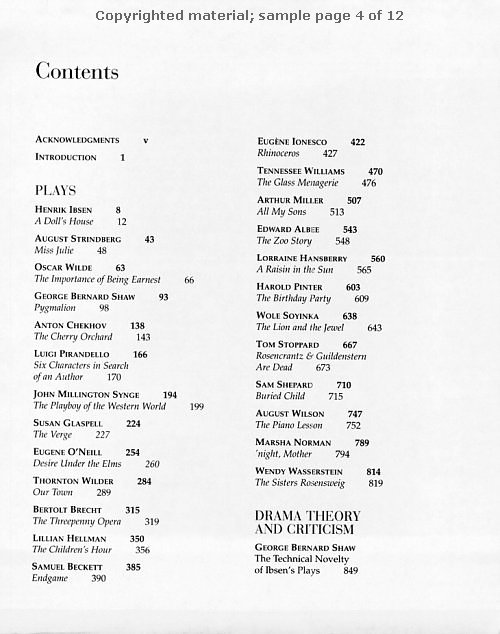
... 2009 lul.sellassie.info : Theatre LUL School
Drama Books
teatr.us Anatoly in Ethiopia
chekhov.us : Dramaturgy
G-groups : playwright & ...
anatoly.vtheatre.net/dramaturg
... filmplus.org/plays [scripts]
* 2008 -- docs.google.com

... 2009 lul.sellassie.info : Theatre LUL School Drama Books teatr.us Anatoly in Ethiopia chekhov.us : Dramaturgy G-groups : playwright & ... anatoly.vtheatre.net/dramaturg ... filmplus.org/plays [scripts]
|
Modern Drama: Selected Plays from 1879 to the Present Walter Levy, Pace University ISBN: 0-13-226721-7 Prentice Hall Paper; 985 pp Published: 10/21/1998
* GODOT'06
From Modernism to POMO (Postmodernity (also called post-modernity or the postmodern condition) is a term used by philosophers, social scientists, art critics and social critics to refer to aspects of contemporary art, culture, economics and social conditions that are the result of the unique features of late 20th century and early 21st century life.) [ see Part III. Theory ]
|
script.vtheatre.net/413/1 -- Part I. Craft
script.vtheatre.net/413/2 -- Part II. Art
script.vtheatre.net/413/3 -- Part III. Theory
script.vtheatre.net/413/4 -- Part IV. Writing
Fall 2003: a few changes (a lot). Do you see the addresses above? I am trying to build the vertical hierarchy (subdirectories).First, start with the Spectator, Actor, Director as a Playwright (Book of Spectator).
Move as much as possible drama analysis from acting and directing webpages.
"Playwright stems from an ancient Saxon word, wyrhta, meaning a worker or craftsman. Drama derives from the Greek word, drao, which means "to do" or "to act." A drama depicts human actions in story form, performed by actors, singers, dancers, or mimes. Aristotle, in The Poetics, defined the major elements of drama as plot, character, thought, diction, music, and spectacle." [ from Anthology of Drama and Theatre ]" If actors were the theater's first artists, playwrights were its first "stars," at least in classical Greece, where the winning dramatist at the theater festivals was accorded honors normally reserved only for state leaders and generals. George Bernard Shaw defined the intellectual function of the playwright, arguing that the writer must "pick out the significant incidents from the chaos of daily happenings, and arrange them so their relation to one another becomes significant, thus changing us from bewildered spectators of a monstrous confusion to men intelligently conscious of the world and its destinies. This is the highest function that man can perform."" [ from "From Page to Stage" ]
script.vtheatre.net/215/5 : playwrighting * write * wrong * wright * rules * anatoly.vtheatre.net/playwright "AMONG THE ARTS, DRAMA--combining theater art and dramatic literature --is peculiarly dynamic. In a very real sense a play is a process rather than a thing. It takes a lot of steps for a dramatic idea to travel from the imagination and mind of the playwright all the way to the mind and imagination of the playgoer or the playreader." [Preface to Drama: An Introduction to Dramatic Literature and Theater Art by Charles W. Cooper; Ronald Press, 1955]

 Writing assignments: 200 words post after reading each play. Midterm (Outline, 1st Draft, Final), Final (and/or the Scene -- the same three stages or rewrites), tests.
Writing assignments: 200 words post after reading each play. Midterm (Outline, 1st Draft, Final), Final (and/or the Scene -- the same three stages or rewrites), tests.
